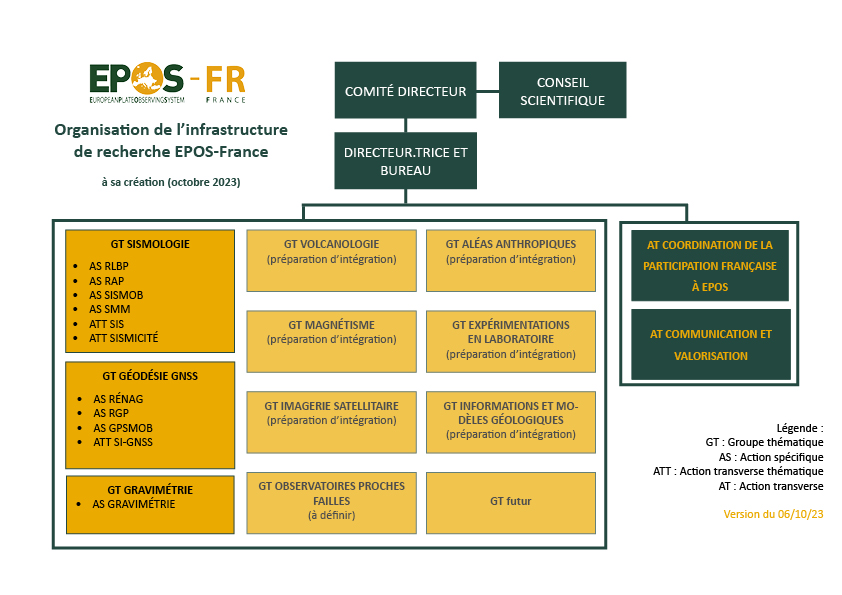Epos-France organization
The organization of the Epos-France research infrastructure is set out in the consortium agreement signed by all partners on October 6, 2023. This organization is largely inspired by that of the Résif-Epos research infrastructure it succeeded (see opposite the organization of the Epos-France research infrastructure when it was launched in the fourth quarter of 2023).
Click on the image to download the pdf file.
Steering Committee
Made up of representatives of the organizations that signed the consortium agreement, the Steering Committee decides on the scientific and strategic orientations of Epos-France. In particular, it issues directives concerning the integration, definition, operation and coordination of transversal and specific Actions, and oversees the coherence between the activities of Epos-France and those of EPOS.
Chairman of the Steering Committee: Éric Beucler – OSUNA, Université de Nantes Atlantique
Organizations that signed the consortium agreement (Nov. 2023):
Scientific Advisory Board
The Scientific Advisory Board is a consultative body that guarantees the relevance and scientific quality of the Epos-France consortium’s activities. In particular, it issues a scientific opinion on the relevance of Epos-France’s actions, as well as proposals for the development of Epos-France and associated research programs.
Composition of the Scientific Advisory Board à actualiser
- Président : Claude Jaupart (IPGP, Paris) – Dynamique des fluides
- Michel Campillo (ISTerre, Grenoble) – Sismologie
- Eric Calais(ENS Paris) – Géodésie
- Fabrice Cotton(GFZ, Potsdam) – Risque sismique
- Ernst Flueh (IFM-Geomar, Kiel) – Sismologie fond de mer (OBS / Ocean-Bottom Seismometer)
- Tonie Van Dam(Université du Luxembourg) – Gravimétrie
- Laurent Jolivet (UPMC, Paris) – Géodynamique
- Laurent Longuevergne (Géosciences Rennes) – IR Ozcar
Executive Board
Headed by a Director, the Executive Board assists and advises the Director in implementing the scientific and technical strategy decided by the Board of Directors. It draws up the budget proposal, and proposals for the development of specific and cross-functional actions, and oversees cross-functional actions.
It is also responsible for interfacing with the research teams and ensuring the day-to-day running of the infrastructure.
Composition of the Executive Board
- Director : Andrea Walpersdorf – ISTerre / OSUG, Université Grenoble Alpes
- Scientific Foresight Manager :
- Internal communication officers : Clément Perrin – Laboratoire de Planétologie et Géosciences/ Osuna, Nantes Université et Blandine Gardonio – Laboratoire de Géologie de Lyon / OSUL
Permanent guests :
- Project Manager: Ana Tempass de Sousa – Osug Grenoble
- Communication and promotion manager: Véronique Bertrand – Eost Strasbourg
- Coordination with EPOs manager: Karin Sigloch – OCA Sophia-Antipolis
Transversal actions
The activities of Epos-France’s Transversal actions concern all the Thematic groups, Specific actions and Thematic transversal actions. There are two of them:
- Transverse action coordination of french participation in EPOS
- Transverse action communication and promotion (Comval)
Links
- AT Coordination / Transversal action Coordination of French participation in EPOS
- AT Comval / Transversal action Communication and promotion
Thematic Groups
In line with the EPOS Thematic Core Services (TCS) at European level, the Epos-France research infrastructure is organized into Thematic groups (TG). A TG is a group of specific and transversal Actions that contribute directly or indirectly to an EPOS TCS.
When a theme does not yet exist at European level, a TG can be created to structure and organize the community at national level and promote it at European level.
Links
- Seismology TG
- Geodesy GNSS TG
- Gravimetry TG
Specific actions
Specific actions include permanent networks and mobile instrument parks.
Links
- SA RLBP / Specific action Permanent broadband network
- SA Rap / Specific action Permanent accelerometric network
- SA Sismob / Specific action Mobile seismological park
- SA-SMM / Specific action Mobile marine seismology
- SA Rénag / Specific action Permanent national GNSS network
- SA RGP / Specific action IGN permanent GNSS network
- SA GPSmob / Specific action GNSS mobile park
Transversal thematic actions
In addition to the Specific actions corresponding, in particular, to instrumental networks and parks, there may be Transversal thematic actions (TTAs) within TGs, which concern several of the TG’s Specific actions. These include, in particular, actions relating to information systems, which process the data collected by the instruments of the whole TG.
Within the GNSS Geodesy Thematic group, for example, this is the GNSS Information System TTA, which handles data from the Renag, RGP and GPSmob Specific Actions. There are also TTAs with broader objectives, such as the Transverse thematic action Seismicity, which coordinates discussions on seismicity in France within the TG Seismology of Epos-France.
Links
- TTA SI-S / Transversal thematic action Seismological information system
- TTAS / Transversal thematic action Seismicity
- TTA SI-GNSS / Transversal thematic action GNSS information system
Integration process for new Actions
The integration of any Action into Epos-France is subject to 3 main stages:
- Present an expression of interest to the Executive Board, explaining the Action’s scientific objectives and how it will operate, and submit this to the Scientific Advisory Board.
- If the Scientific Advisory Board and the Executive Board give a favorable opinion, a more detailed file explaining the technical, scientific and organizational functioning of the new Action is drawn up and submitted to the Executive Board.
- As soon as the Executive Board considers the dossier to be complete, the dossier and the Scientific Advisory board’s opinion are submitted to the Steering Committee. The BoD issues an opinion and comments, which are taken into account before the Steering Committee votes on the integration of the new Action.


